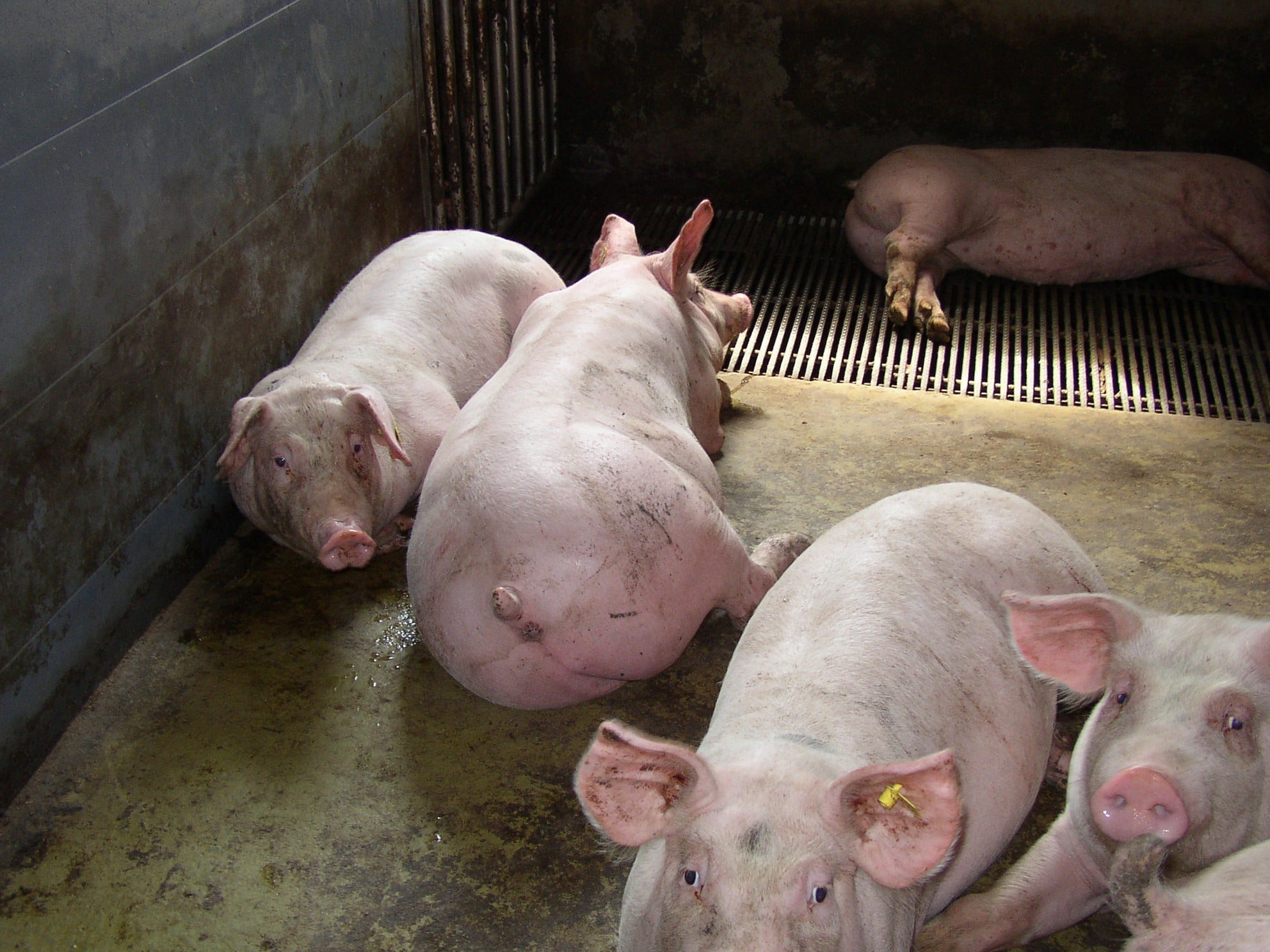
Case for being a vegetarian: To eat meat or not: what does your moral instinct say?
Peter Chan 2018-04-24
To eat meat or not: what does your moral instinct say?
A moral experiment arguing against the consumption of farmed animals
Most humans agree that torturing an animal is morally wrong, that means, most would agree non-human animals’ suffering matters, at least to a minuscule degree.
I want to try something with you to probe your moral sense.
The Experiment
Consider this moral experiment. There’s a torturing machine in front of you. You need to use the machine to deliver an agonising electric shock to either a rabbit or a human for 4 hours.
Which would you choose? Chances are, you’ll choose to deliver the shock to the rabbit. That’ll also be my choice too.
What about this then: You have a machine and a slightly uncomfortable chair, this chair is no big deal, it’s just like chairs used by nasty malls to prevent people staying for too long (like the one shown in the picture). You must either make the human sit on the chair for 10 seconds or shock the rabbit for 4 hours non-stop. What will be your choice?
I would choose to make the man sit on the chair. Without meticulous statistics, I bet most people would do the same.
The only difference between the two scenarios is that, in the second scenario, the human suffers less than the first one.
What does it imply, then, if people are changing their mind?
The non-vegetarians who changed their mind, or at least found the decision process harder, endorse that there’s a proportionality between the moral-worth of humans and other animals, and such moral-worth is comparable.
Wow. That sounds like a bunch of jargon! Fret not though — let me explain bit by bit.
Let’s start with what do I mean by “moral-worth is comparable”. By saying “comparable”, I mean the worth of humans and the worth of other animals are on the same continuum. They can be directly compared, even with the assumption that humans worth far higher than any other animals.
The fact that the worth of animals and humans can be compared is precisely why some people would choose to make the human sit on the uncomforable chair over shocking the rabbit. Making a person feel uncomfortable is a form of human suffering, but in the face of casting a rabbit into excruciating pain, the former is better. In other words:
An extreme form of non-human animal suffering is far worse than trivial, mild humans suffering.
This is what I mean by comparable: A human’s pain and an non-human animal pain are not in different moral categories — it is not the case that a form of trivial human suffering carries more moral significance than the most horrendous form of non-human animals suffering.
Second, proportionality.
Say if we gradually increase the level of suffering for the human, going from a very uncomfortable chair, to receiving an injection, to a slap on their face, to shock him for an hour, and so-and-so forth. Plausibly more people would side to shock the rabbit to save the human from pain.
Different people may have different turning points; some are higher, some are lower. It’s, though, very likely that you have one also, unless you agreed to torture a rabbit to save a human from sitting on a chair that is probably just a bit less comfy then the chair you’re sitting on.
This shows proportionality: when the suffering of the human relative to the rabbit exceeds a certain proportion held by us, we choose to torture the rabbit. It is based on our moral (maybe arbitrary) judgement of how much more humans are worth than other animals. We attempt to derive the optimal moral choice in every case. Therefore, we can see that moral choices on non-human animals are based on:
1) the proportion of how we perceive humans worth more than other animals
2) our estimation of how much pain/pleasure the choice would cause the non-human animal and human in each case
Okay, So What?
Before deriving any conclusion from this experiment, one crucial limitation to note is that pain/pleasure is not quantifiable. We can’t say that shocking a rabbit at 4000V 0.05mA yields a moral score of -50 and doing the same to a human would yield -300, and a human worth six times more. You can see this is nonsense.
Does it mean we should cease comparing levels of pain/pleasure at all? We simply can’t. We make comparisons and predictions on pain/pleasure levels long before we even heard of the theory. Have you ever say “Thank you” to a waiter in restaurant? We express our gratitude to others, not to pose ourself as educated, decent chaps, but with a wish to make others happy. You won’t know whether this will generate +5 points of happiness, but as humans, we know that he would be happy. As highly socialised species, we generally have a good ability to grasp whether others are happy, and how happy others are.
And, by switching choice from shocking the rabbit in the uncomfortable chair paradigm, you have already evaluated and compared the worth of feelings — you decided sitting on an uncomfortable chair is much less bad than being shocked, and that was the reason you shifted your choice. In short, we have a good sense of how bad/good an experience is.
I would argue for that, had we exerted our ability to evaluate goodness(for humans) and badness (for other animals) on consuming farm animals, and applied the same moral decisions on proportionality in experiment consistently in life. Most of us would abandon eating farmed animals at least, if not go straight to be vegans.
Say you roasted a (farmed) chicken on a warm Thanksgiving dinner. Basically what you’re doing is this:
You took a lifetime of inhumane confinement (well, only humans deserve humane treatment as the word implies?), where the chicken lived an A4-sized battery which he could barely turn, with an overpowering smell of shit 24 hours a day. He had his mouth (peck) chopped off without anaesthetic when he was a baby, and suffered a fearful and painful processing of slaughtering. All of this is then translated to a rather brief positive sensation of the chicken piece passing through your tongue, in which, may be you didn’t even notice how good it tasted as you were too busy talking with your brother. My words are just simply inadequate to illustrate how disheartening the living conditions of these animals are: check this video out:
I can neither coin a sensible coefficient on how many times worse is the suffering aggregated over the lifetime of miserable chicken over the pleasure your family derived from his body; nor can I tell you how many times a human worth more than a chicken.
I just know we have been asking the wrong question — we ask: “Are humans more important than other animals?”
If it’s a yes then we can eat them.
Actually, the real question to ask is: “Is few seconds of your fleshly enjoyment more important than the lifetime suffering of an animal?”
If your answer is yes, then please eat as much as you like. This argument can only appeal to the soft spot of consciousness — it can’t prove you wrong (but other arguments can).
The decision is up to you. So, Is it a good moral tradeoff? I leave the decision to you.
Yet, there is something to note. Do you still remember the moral experiment? If you think eating farmed animals is okay, how are you different from people who believe shocking the rabbit for four hours is better than letting the human sit on the chair?
Or, the simplest of all, why don’t you buy some live rabbits and sit on them? I am sure you would derive more comfort from their about-to-burst tummy than any other chairs in the world.
What’s next?
I turned to be a pescetarian two years ago — that means I gave up on eating all meats but seafood. No. No moral justification for that.
I believe eating fish is morally wrong. My pleasure doesn’t outweigh their pain.
After all, I am not a perfectly moral being. I chose it just because it’s lesser of the evil — fish are not raised in such a miserable environment at least.
However, one thing that struck me hard is that at least we cared. If you step back — why should we care at all? Can you prove to me, why we need to be good, to other humans or animals? I can’t. But I just know we want to, and we do.
To me, caring for others is one of the true miracles in the world.
And we act in response to our consciousness, bit by bit, bit by bit. We want to be better and better — though we know we won’t be perfect.
That’s the reason I became a pescetarian.
I know, telling you to change your diet is a lot to ask. But if, and only if, my argument touched your heart, why don’t you start by doing something small?
I suggest you three easy choices; I solemnly pledge you to do at least one of them:
1) Say no to Foie gras — it’s simply the worst kind of shit
2) Eat one vegetarian meal in week — start from today
3) Donate $10 to any non-human animals welfare organisation.
4) More veg, less meat. It is good for you, the animals, and the earth.
Let’s work towards a better world together.
For geeks who want to know even more Some good articles to learn about non-human animal ethics Equality for Animals? By Peter Singer https://www.utilitarian.net/singer/by/1979----.htm
What is animal liberation? By PETA https://www.peta.org/about-peta/learn-about-peta/ingrid-newkirk/animal-liberation/
Some further food for thoughts:
- Is it more moral to eat food that is tasty? As we derive more pleasure from the same (assumed) amount of suffering. - Is it better to eat big non-human animals? Again it reduces the quantity of suffering. - Why humans worth more innately? - You made decisions in the moral experiment. Do your ACTUAL decisions reflect how is it OUGHT to be? - Are the decisions grounded in just morality and rationality? What if I replace the rabbit with a mouse? Would you still make the same choice? (okay. I admit I used rabbit intentionally.)
At the moment, I could not provide adequate answers to these questions. When I do, you can be assured I will write an article about it.
